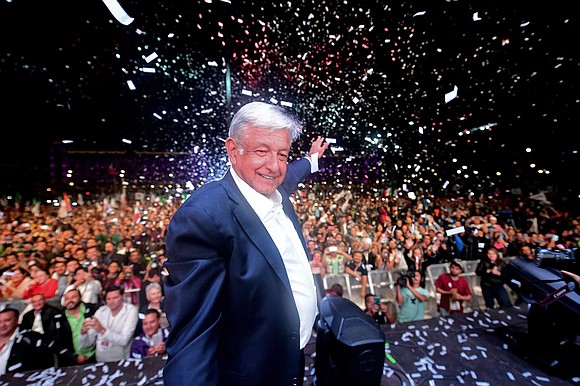Who is Mexico's Andres Manuel Lopez Obrador?
CNN/Stylemagazine.com Newswire | 7/2/2018, 11:33 a.m.
By Susannah Cullinane, CNN
(CNN) -- An anti-establishment, long-shot candidate whom experts say ran a nearly "flawless" campaign but whose critics fear might rule like Venezuela's authoritarian leader, Hugo Chavez, will become Mexico's next president.
Andres Manuel Lopez Obrador claimed victory in a speech late Sunday, telling supporters gathered in Mexico City that the primary mission of his government will be to eradicate corruption from the country.
"Corruption is not a cultural phenomenon but it is the result of a political regime in decay. We are absolutely certain that this evil is the principal cause of social inequality and of economic inequality," he said. "Because of corruption, violence has erupted in our country."
It's not the first time Lopez Obrador, known by his initials AMLO, has run for president. Indeed, after failed bids in 2006 and 2012, he rejected the results, claiming fraud.
But the third time proved the charm, buoyed in part by Mexico's alarming murder rate and the candidate's promise to take on the country's entrenched political class by cleaning house.
So who is Andres Manuel Lopez Obrador and what does his presidency have in store for Mexico, and its neighbor to the north?
'Power mafia'
Lopez Obrador ran on a populist platform to break what he described as the grip that elites -- or the "power mafia" -- have on Mexican society.
He said he would lower the salaries of top officials and give those at the bottom a pay raise. He promised to sell the presidential planes, turn the presidential palace into a public park and cut his own salary in half.
A former mayor of Mexico City, Lopez Obrador began his political career as a member of the ruling Institutional Revolutionary Party (PRI). He later joined the Party of the Democratic Revolution and more recently formed his own party, the National Regeneration Movement -- known by its Spanish acronym as MORENA.
Despite his long political resume, many observers considered the 64-year-old candidate an outsider and his anti-establishment stance has garnered comparisons to US President Donald Trump.
However, Duncan Wood, the director of the Wilson Center's Mexico Institute, told CNN's Rafael Romo that while Trump is an anti-politician, Lopez Obrador is a lifelong, professional politician.
"I think that's the single most important thing to say about AMLO versus Trump. But they do share certain characteristics. In terms of economic policy, both Donald Trump and Andrés Manuel (Lopez Obrador) are economic nationalists."
Wood said that Lopez Obrador had run a "nearly flawless campaign."
"He's hit all the right notes with the Mexican people," Wood told Romo.
"He doesn't want to be the President who kowtows to President Trump. He doesn't want to be the President who sells out national pride. He wants to be a president who stands up to the United States. He wants to be a President who says, 'We deserve and we demand respect,'" he said.
The new President will have to contend with Trump's threats to pull out of the North American Free Trade Agreement and his calls for the construction of a border wall between the two countries, among other divisive talking points.
Lopez Obrador pushed back against plans for a wall in a book he wrote titled "Oye Trump," or "Listen Trump." He also pledged to propose to keep NAFTA.
Third presidential bid
However, his critics say he has an authoritarian streak and could be Mexico's Hugo Chavez, referring to the socialist Venezuelan President who led his country to economic ruin.
This race marks Lopez Obrador's third presidential bid. After he lost his first presidential election in 2006, he not only called the results a fraud, but also christened himself "the legitimate president of Mexico." His supporters protested nationwide, and in Mexico City, they staged sit-ins and blockades. Some spent weeks camping out in protest with thousands of supporters in Mexico City.
He alienated many Mexicans and lost again by a wider margin in 2012.
After his second loss, Lopez Obrador also claimed fraud kept him from winning the presidency and filed a legal challenge to invalidate the vote.
However, the nation's electoral tribunal ruled that the demand to invalidate the election was "unfounded" and that Lopez Obrador's coalition didn't prove any constitutional violations or that the process hadn't been free and fair.
But after years of gang violence and corruption scandals involving traditional parties, it appears Lopez Obrador has succeeded in his presidential goal.
When he takes office later this year, he faces homicide rates that have soared to an all-time high. Critics have accused current Mexican President Enrique Peña Nieto of failing to adequately deal with crime, corruption and economic inequality. Peña Nieto could not seek re-election under Mexico's single six-year term for its presidents.
Preliminary results released late Sunday predict Lopez Obrador will win 53.0% to 53.8% of the votes, with tallying of the official election results set to begin Wednesday.
Lopez Obrador told his supporters he would convene representatives from the United Nations and human-rights and religious organizations to create a peace plan for his country.
"As of tomorrow, I will call upon representatives of human rights, religious leaders, the United Nations and other national and international organizations so that we can meet as many times as necessary to develop a plan of reconciliation and peace for Mexico that we will apply from the beginning of our new government," he said.
He is set to formally take over from President Peña Nieto on December 1.




